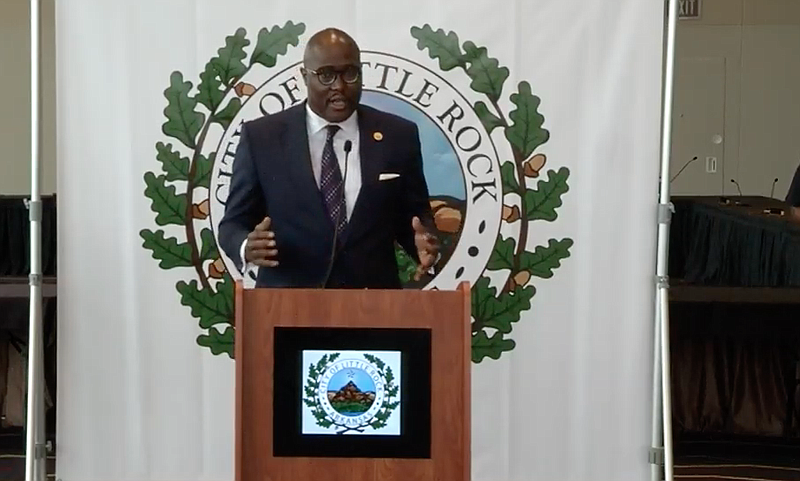Little Rock Mayor Frank Scott Jr.'s third State of the City address is scheduled to air at 6 p.m. today, but this time the speech is expected to be different from years past.
Scott's address will be delivered virtually because of the coronavirus pandemic. According to the city, the "Rebuild the Rock: State of the City Virtual Experience" will feature residents as they describe experiences and struggles from 2020 as well as their aspirations for 2021.
Scott also reportedly will deliver "a major announcement about how we plan to Rebuild the Rock and put our city back on the right footing for more success in 2021 and beyond," the mayor said in a statement earlier this month.
The content of the plan Scott will unveil remains unclear, but the return to a sales-tax increase he initially floated last year before the coronavirus outbreak spiraled into a crisis in the United States is a possibility.
Scott has signaled that he wants to move forward with the tax increase, according to Jay Chesshir, president and CEO of the Little Rock Regional Chamber of Commerce.
Scott proposed a 1% sales-tax increase during last year's State of the City address in late January.
At the time, Scott pitched the tax increase as a way to fund quality-of-life initiatives in the city using an expected $50.5 million in new annual revenue. City directors approved a budget of $272.7 million for 2021.
Those proposed expenditures included approximately $84 million for public-safety initiatives, $70 million for the Little Rock Zoo and nearly $167 million for a variety of upgrades and new facilities to enhance parks and recreation offerings.
But the effort to send the tax increase to voters was ultimately abandoned in March during the worsening outbreak and an economy wracked by job losses.
Citing "uncertain economic times" and "more difficult days ahead," Scott announced that he would not pursue the sales-tax increase exactly a year ago on March 25.
"We need to focus our time and attention on helping small businesses and individual workers who are impacted so we can all survive this season," the mayor said in a news conference at the time.
Sending the sales-tax increase to voters would require a vote by the city Board of Directors.
An existing three-eighths percent tax that funds general operations and maintenance is set to expire at the end of this year.
Scott did not respond to a voicemail Wednesday.
In a phone interview on Tuesday, Chesshir said that based on reports and conversations with the mayor, officials "know that he's wanting to move forward" with the 1% tax increase.
However, Chesshir said officials have not seen the actual plan, explaining that there has been "nothing to consider" in terms of the chamber's support.
The chamber works closely with the mayor on economic development issues and needs, he said, adding that the group is "hopeful that when he unveils his plan, that those things will be part of it, so we're anxiously awaiting the plan ourselves."
According to Chesshir, the conversations with the mayor's office started "well over a year ago about some of the things that he was looking at doing," but Chesshir reiterated that chamber officials have not yet seen a specific plan.
He said that once a formal plan is unveiled, the chamber will have to go through a process before the organization adopts a position.
